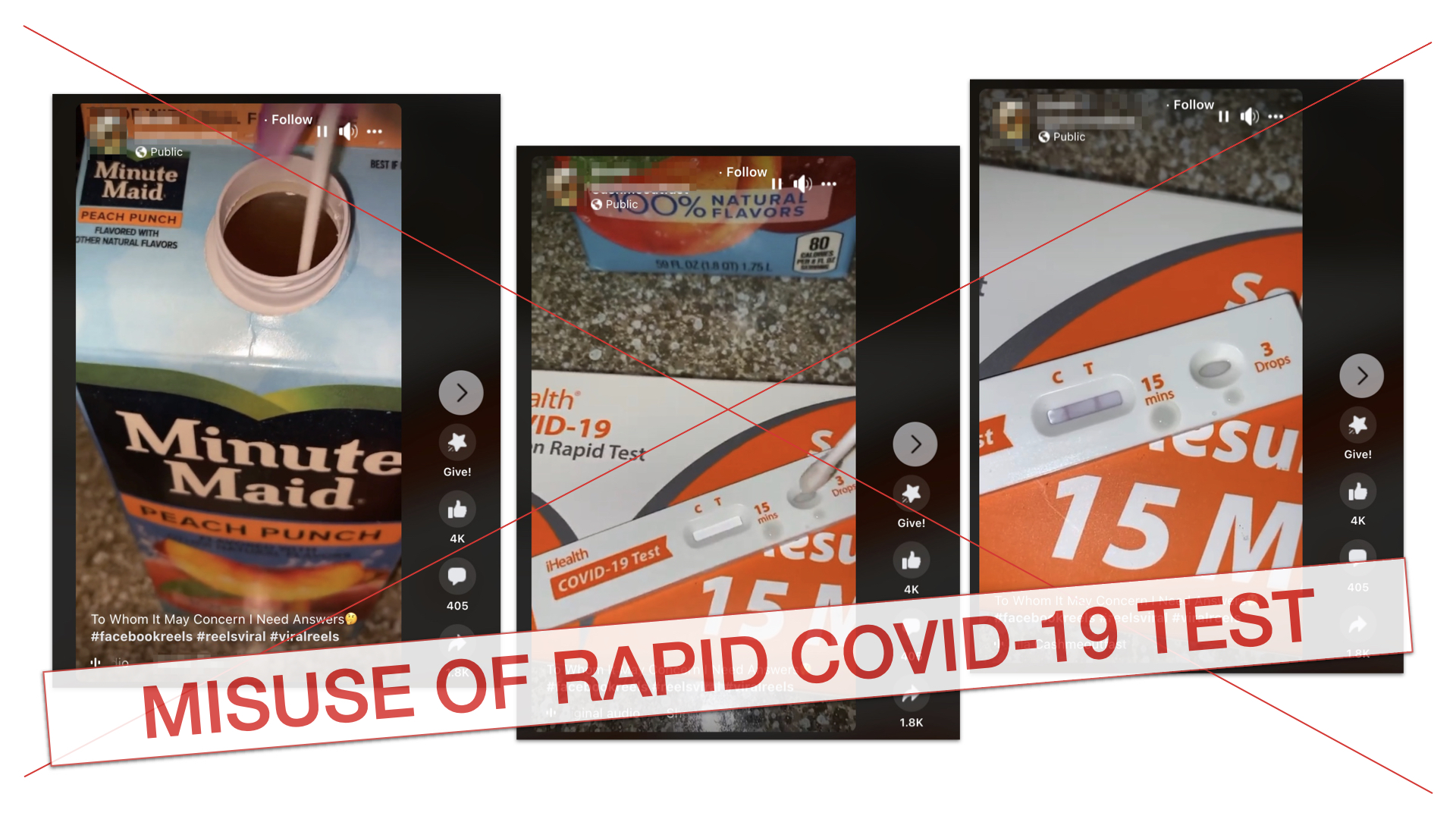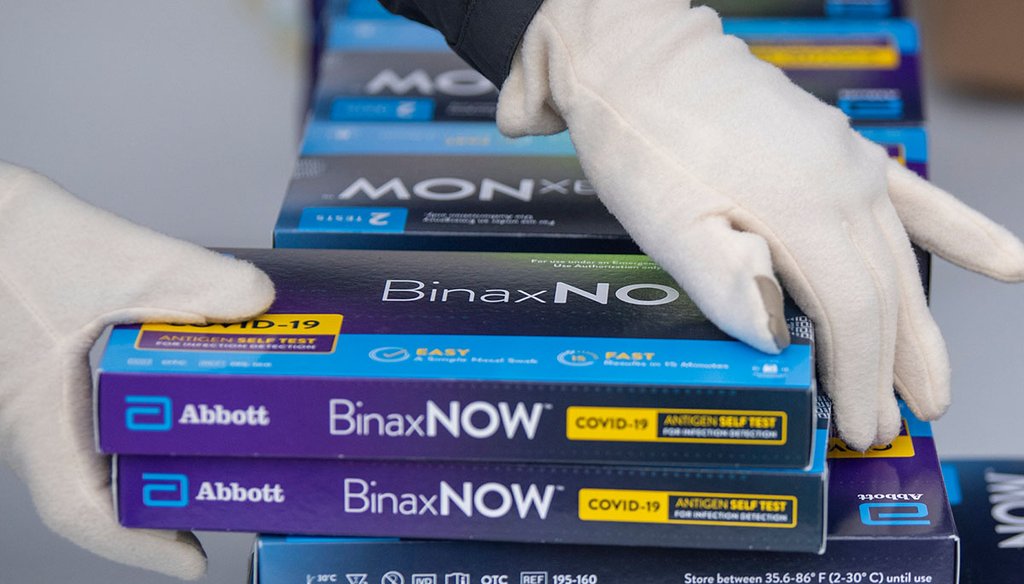



A Youngstown City Health Department worker grabs two at-home COVID-19 test kits Dec. 30, 2021, in Youngstown, Ohio. (AP)
A Facebook user claimed that Minute Maid Peach Punch tested positive for COVID-19 on a rapid test. The test appeared to display positive results, but that doesn’t mean the test detected the virus.
Research shows that certain substances can cause rapid antigen tests to display false positive results, particularly when used without the test’s provided buffer solutions.
Rapid COVID-19 tests are meant to analyze human samples, not drinks, so those positive results do not mean the tests are inaccurate, an expert said.
Videos shared on Facebook suggest that testing samples of different beverages on at-home COVID-19 tests will get you a positive test result.
In a video shared March 2, a Facebook user claimed she’d been accused of faking a positive COVID-19 rapid test result after testing a sample of Fanta Orange soda.
"A lot of you guys were saying that it was fake," she said. "So I went in my refrigerator and I grabbed a jug of Minute Maid Peach Punch, and I went ahead and put three drops on" the COVID-19 test, she said, as video showed her using a swab to add droplets of punch into the sample port of an iHealth COVID-19 test.
"So the first line did pop up," she said seconds later. "And then it (began) to look like a second line, but it wasn’t really clear, so we’re going to let it sit for a little more time. Mind you, you do have to let the COVID test sit for 15 minutes to get accurate results."
After just a few more seconds, though, she reached her conclusion.
"So, here you can see: That is definitely a positive COVID test," she said. "It did test positive for COVID, Minute Maid Peach Punch."
"I need answers," the Facebook user wrote, adding the thinking emoji. A person in the comments suggested that the positive result furthered their belief that the tests "are bogus." Other people suggested the positive result came from failing to follow the test’s instructions.

(Screenshots from Facebook.)
This post was flagged as part of Facebook’s efforts to combat false news and misinformation on its News Feed. (Read more about our partnership with Meta, which owns Facebook and Instagram.)
Testing drops of some beverages (and other substances) with a COVID-19 test can cause the test to display a positive result. That does not mean those drinks contained the virus, nor does it prove that at-home COVID-19 tests are unreliable.
In 2021, researchers found that adding samples of soda, energy drinks, alcoholic beverages and even bottled water to what’s known as the "sample port" of an at-home COVID-19 antigen test can cause a positive red test line to appear.
When tests are used according to the directions, the sample port refers to the part of the test where you add droplets of the liquid that contain a biological sample from a nasal swab.
However, when those same drinks were equally mixed with the recommended buffer, the tests did not produce positive results. The researchers theorized that the false positive results could stem from the drinks’ pH interacting with the COVID-19 test.
When the Facebook user ran her Minute Maid Peach Punch experiment, she did not use the recommended buffer.
Dr. Alexander Edwards, an associate professor in biomedical technology at the University of Reading in England, told PolitiFact in an email that manufacturers and researchers who create COVID-19 rapid tests know that "a few things" such as an acidic liquid, "can cause false positive results."
"The sample collection liquid supplied with the tests corrects for acidity in swab samples by containing a buffer," Edwards said.
For those who know how rapid COVID-19 tests work, it’s not surprising that drinks can cause the tests to record a positive result, he said. And those positive results don’t prove that the tests are inaccurate.
"We should never be testing drinks," he wrote. "These tests are intended to test human samples!"
The U.S. Food and Drug Administration’s posted directions for the iHealth COVID-19 rapid test instruct users to swab the inside of both nostrils "in a circular motion" at least 5 times over the course of about 15 seconds. Next, people must insert the swab into the tube of buffer liquid, stir it at least 15 times, and squeeze the tube while removing the swab to collect as much liquid as possible.
After replacing the dropper cap to the tube of buffer liquid, people should add three drops of the sample to the test’s sample port. Then, it’s time to wait 15 minutes.
The Facebook user added three drops of liquid and mentioned the need to wait 15 minutes, but she did not follow the test instructions. She dropped juice — not a nasal swab sample — directly into the sample port with no buffer solution and read her result well before 15 minutes had passed.
When rapid test instructions are followed, Edwards said test accuracy is "remarkably good," with incorrect positive results "typically happening less often than in 1 in 1,000 tests."
"With any medical device or test, if you don’t follow instructions there is a risk of incorrect result," he said.
Even when used correctly, rapid tests aren’t perfect. The FDA says at-home COVID-19 antigen tests are less accurate than molecular tests, such as PCR tests. While PCR tests are expected to detect the SARS-CoV-2 virus at least 95% of the time when a person is infected, at-home antigen tests "are generally expected to detect the SARS-CoV-2 virus at least 80% of the time," the FDA wrote.
Still, if tests are used per the instructions, the limitations "are massively outweighed by benefits," Edwards said.
In a statement, iHealth said that acidic substances, such as juice or soda, can alter the pH value of the COVID-19 test card and lead to inaccurate test results. For that reason, "it is important to strictly follow the instructions and avoid external factors that can interfere with the accuracy of the test results," it said.
A Facebook user claimed that her video showed that Minute Maid Peach Punch tested positive for COVID-19 on a rapid test.
Researchers found that certain substances can cause rapid antigen tests to display false positive results, particularly when used without the test’s provided buffer solutions. And the positive results don’t mean that the test detected the virus.
An expert said that the tests are meant to analyze human samples, not drinks, so those positive results do not mean the tests are inaccurate. There is always a risk of incorrect results when medical test instructions are not followed properly, he said.
We rate this claim False.
UPDATE, March 13, 2023: This version has been updated with a statement from iHealth. The rating is unchanged.
RELATED: Austrian politician goofed in testing Coca-Cola sample for COVID-19
Email interview with Dr. Alexander Edwards, an associate professor in biomedical technology at the University of Reading, March 10, 2023
Full Fact, Lemonade and Fanta don’t test positive for COVID-19, Jan. 18, 2022
PolitiFact, Austrian politician goofed in testing Coca-Cola sample for COVID-19, Dec. 17, 2020
Yahoo Finance, These 10 drinks can lead to a false positive COVID test, new study says, Sept. 24, 2021
U.S. Food and Drug Administration, iHealth COVID-19 antigen rapid test instructions for use, accessed March 9, 2023
Elsevier Public Health Emergency Collection, How to (ab)use a COVID-19 antigen rapid test with soft drinks? Aug. 18, 2021
iHealth, iHealth COVID-19 antigen rapid test self-test at home, accessed March 10, 2023
Reuters, Fact Check-Fruit juices and coffee cannot produce a positive test result for COVID-19, July 16, 2021
Full Fact, Ketchup did not ‘test positive’ for COVID-19, April 29, 2021
U.S. Centers for Disease Control and Prevention, At-Home COVID-19 Antigen Tests-Take Steps to Reduce Your Risk of False Negative Results: FDA Safety Communication, Nov. 17, 2022
NBC News, Rapid Covid tests give many false negatives, but that might mean you're not contagious, June 15, 2022
In a world of wild talk and fake news, help us stand up for the facts.
